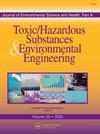Degradation of diclofenac using advanced oxidation processes: a review.
IF 2.1
4区 环境科学与生态学
Q4 ENGINEERING, ENVIRONMENTAL
Journal of Environmental Science and Health Part A-toxic\/hazardous Substances & Environmental Engineering
Pub Date : 2025-01-01
Epub Date: 2025-03-02
DOI:10.1080/10934529.2025.2472116
引用次数: 0
Abstract
Diclofenac (DCF) is one of the emerging compounds in the environment. There are many sources of diclofenac, such as effluent of pharmaceutical industries, wastewater treatment plant effluent, and domestic wastewater. It requires advanced treatment because it cannot be removed from water and sludges using the conventional wastewater treatment process. Catalytic and free radical methods also known as advanced oxidation process (AOP) can degrade large and complex organic compounds into smaller ones. In this review, each AOP method is critically assessed for the removal of DCF in water.
高级氧化法降解双氯芬酸的研究进展。
双氯芬酸(DCF)是环境中新兴的化合物之一。双氯芬酸的来源有很多,如制药工业的废水、污水处理厂的废水和生活废水。它需要高级处理,因为它不能用传统的废水处理工艺从水和污泥中去除。催化和自由基方法,也称为高级氧化过程(AOP),可以将大而复杂的有机化合物降解成较小的有机化合物。在这篇综述中,每种AOP方法都被严格地评估了水中DCF的去除。
本文章由计算机程序翻译,如有差异,请以英文原文为准。
求助全文
约1分钟内获得全文
求助全文
来源期刊
CiteScore
4.10
自引率
4.80%
发文量
93
审稿时长
3.0 months
期刊介绍:
14 issues per year
Abstracted/indexed in: BioSciences Information Service of Biological Abstracts (BIOSIS), CAB ABSTRACTS, CEABA, Chemical Abstracts & Chemical Safety NewsBase, Current Contents/Agriculture, Biology, and Environmental Sciences, Elsevier BIOBASE/Current Awareness in Biological Sciences, EMBASE/Excerpta Medica, Engineering Index/COMPENDEX PLUS, Environment Abstracts, Environmental Periodicals Bibliography & INIST-Pascal/CNRS, National Agriculture Library-AGRICOLA, NIOSHTIC & Pollution Abstracts, PubSCIENCE, Reference Update, Research Alert & Science Citation Index Expanded (SCIE), Water Resources Abstracts and Index Medicus/MEDLINE.

 求助内容:
求助内容: 应助结果提醒方式:
应助结果提醒方式:


